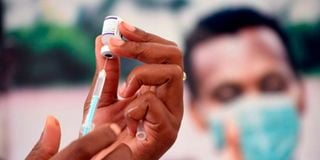Why Covid, flu viruses spread and become more lethal when it’s cold

A health worker prepares to administer a Covid-19 vaccine.
What you need to know:
- Cold and flu usually hit their peaks between April and June, which coincides with the coldest stretch of the year.
- The second peak also tends to set in, especially for Nairobi, during the chillier months of August and September.
The long rainy season started in April, with May expected to be the wettest month. This season overlaps with the cold season that is normally experienced between April and July, with June-July being the coldest period.
For many, cold weather is just not our thing, and that is partially why we spend more time huddled indoors. The cold temperature and long periods spent in closed premises naturally makes it easier for the common cold, the flu and Covid-19 to spread, especially the highly transmissible variant Omicron.
However, there are other reasons why cold weather makes it easier for these viruses to spread more.
Let’s start with the cold and flu. While they can strike at any time, they usually hit their peaks between April and June, which coincides with the coldest stretch of the year.
The second peak also tends to set in, especially for Nairobi, during the chillier months of August and September.
Viruses that cause infections
It a myth that cold temperatures themselves cause the cold or flu. In fact, the viruses that cause these infections thrive in dry and cold conditions. The reason why these infections are more common during the cold season is partially because our bodies cope differently with the entry of germs during cold and wet seasons.
Viruses that affect the respiratory system enter the body through the mucous membrane of the mouth and the nose. These membranes are protected by the mucus itself, as well as blood components such as white blood cells. During the cold seasons, however, the natural body reaction is to reduce blood circulation close to the surface to reduce heat loss. The reduced surface circulation reduces the efficiency of surveillance of germs that lodge on the membranes, making them more vulnerable to pathogen entry.
It’s also believed that the mechanism the body uses to remove germs lodged in the respiratory system to expel germ-ridden mucus is not efficient during cold weather.
While the peaks of infections caused by other viruses are epidemically predictable based on weather, Covid-19 has been striking year-round, regardless of season.
Fewer cases of Covid-19
Risks for infection [increase] as we spend most of our time during cold seasons indoors. We gather closely in spaces that may offer less-than-ideal ventilation and reduced social distance. Heating systems also make indoor air drier. Studies have shown that these conditions can greatly affect the transmission of respiratory viruses. Not surprisingly, the high numbers of people travelling and gathering during the recent winter holidays in Europe and the United States have contributed to the surge in the highly contagious Covid-19 Omicron and its sub-variants.
Although the country is reporting fewer and fewer cases of Covid-19, this does not signal the end of the pandemic. We must make the most of this opportunity to protect as many people as possible with the vaccine and close all the avenues for a Covid-19 resurgence. Unfortunately, Kenya’s Covid-19 vaccine uptake has remained low.
Getting vaccinated against the flu and Covid-19 is your best protection against serious illness and admission to hospital. While Omicron infections mimic the cold in many vaccinated/boosted people, the variant still results in unfavourable outcomes, including admission to hospital and death for a small but significant population. These negative outcomes are more likely among the unvaccinated. According to recent reports by the Centers for Disease Control and Prevention, they are 20 times more likely to die from Covid-19 than the fully vaccinated.
Continuing with precautions, such as wearing a mask, goes a long way. Wearing a mask during the cold season also helps to keep a warm air current in the upper respiratory system, thus allowing blood circulation to the surface, thus improving protection. Handwashing and sanitising should also be upheld.
It’s not too late to get your annual flu or Covid-19 vaccine, including the booster. You can get your Covid-19 vaccine for free at the nearest Health ministry vaccination post.
Ms Mochache is the Principal Secretary, Ministry of Health. [email protected]





